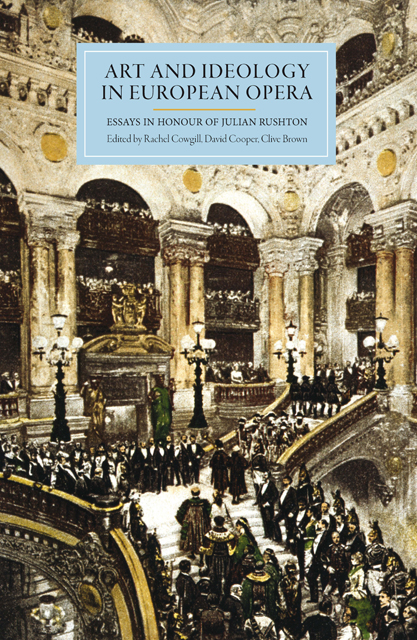Book contents
- Frontmatter
- Contents
- List of Figures
- List of Music Examples
- List of Tables
- Notes on Editors and Contributors
- Acknowledgements
- Introduction
- I Nationalism, Cosmopolitanism and National Opera
- II Opera, Class and the Politics of Enlightenment
- III Opera and Otherness
- Julian Rushton: A Family Memoir
- 7 The Works of Julian Rushton
- Index
- Tabula Gratulatoria
10 - The Victorian Violetta: The Social Messages of Verdi’s La traviata
Published online by Cambridge University Press: 28 February 2023
- Frontmatter
- Contents
- List of Figures
- List of Music Examples
- List of Tables
- Notes on Editors and Contributors
- Acknowledgements
- Introduction
- I Nationalism, Cosmopolitanism and National Opera
- II Opera, Class and the Politics of Enlightenment
- III Opera and Otherness
- Julian Rushton: A Family Memoir
- 7 The Works of Julian Rushton
- Index
- Tabula Gratulatoria
Summary
Ensuring that Victorian notions of decorum and morality were adequately preserved in stage works was an ‘official’ preoccupation in mid-nineteenth-century London. To ensure adherence to ‘standards’, all theatrical works, including operas, had to pass through the Lord Chamberlain's Office for approval and sometimes censoring before production. No precise rules for censoring stage texts existed, but for many operas officials feared that religious, political, social or, above all, moral improprieties in the stories might either negatively influence or else offend audiences. Officials exercised their judgments based in large part on personal predilections, under the pretext of protecting the public. Beyond opera plots, a troubling aspect for Victorian censors was the impropriety of many female characters. Not only did these fictitious women often engage in questionable activities and display improper behaviour on stage, but they were portrayed by women who in real life, simply because of their occupations, were stereotyped, according to social codes, as living tainted lifestyles. The independence of many female star singers from conventional domestic roles and expectations as wives, mothers and daughters, their association with a profession that was deemed immoral, their cosmopolitan travelling lifestyles and their physical exhibitionism on stage, among other matters, served to brand them as less than ‘perfect Victorian ladies’. Embodying many of the elements licensing officials most feared bringing to public attention, these ‘othered’ females – both as operatic characters and as singing actresses – occupied a less than elitist position in an elitist artistic world. Given these considerations, Verdi's La traviata, its heroine Violetta Valery and the women who first performed the role for London audiences became especially controversial in Victorian London.
Verdi's Traviata
Verdi himself was well aware from the outset that La traviata might encounter difficulties, but the story contained the ‘new, grand, beautiful, varied, bold, and radically daring’ dramatic components he declared that he required for his operas, and was far from ‘the usual things without novelty or variety’ about which he complained. Ever mindful of having a convincing drama that he understood well, the composer came to believe firmly that the impact of a story lay in its contrasts and that such contrasts hinged on the psychological profiles and personal interactions of the characters.
- Type
- Chapter
- Information
- Art and Ideology in European OperaEssays in Honour of Julian Rushton, pp. 222 - 240Publisher: Boydell & BrewerPrint publication year: 2010

